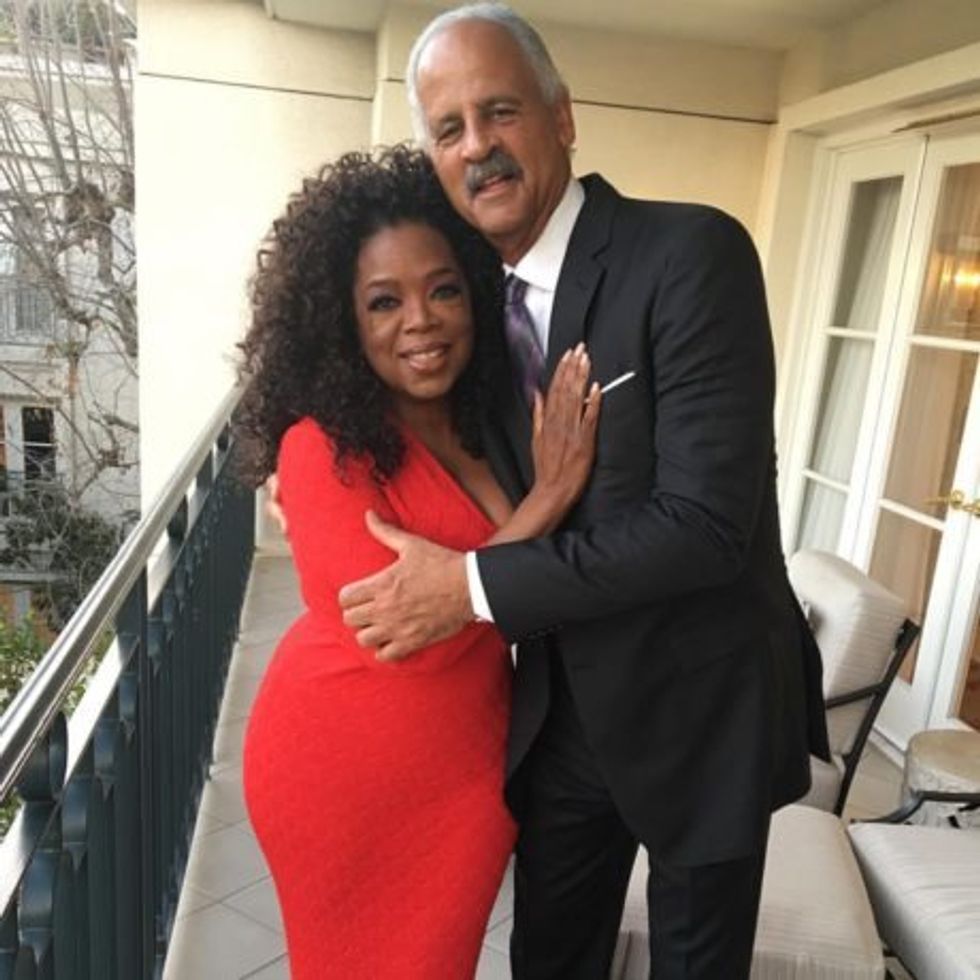
“And you're okay with your role as an unwed baby mama?"
The pressures that come with becoming a Mrs. in America weigh heavily on a woman. The nitpicking begins from day one, and the need to be on the inside of someone's relationships starts at “so what are y'all?" You and the person you've been dating stamp labels on one another, finally becoming boyfriend and girlfriend. It's pretty serious at this point. Time passes–two years, three years–and you're faced with inquiries of when marriage will come into play because time is ticking. What have you two been doing all these years? It's only right you get married right now.
“When is he putting a ring on it?"
“So y'all started ring shopping yet?"
You both feel it's not time and criticism from the left and the right pour in. You hear breakdowns of the statistics within Black communities on marriage and are encouraged to break the cycle.
“Don't you two go off and have babies now without committing before the Lord."
Years go by and a baby makes its way into the picture before the bling on your finger, going against that children's song “K-I-S-S-I-N-G" you used to recite. You're both comfortable where you're at in life, and marriage doesn't take precedence in your list of priorities right now.
“Why buy the cow, when you get the milk free?"
You'll hear that often. Your title in the eyes of other people has now shifted, too, as you're now the baby mother and not the girlfriend. The ring will get you back into society's good graces, and you're not saying it won't ever happen, but satisfying society's standards on relationships is outside of your realm right now–no matter how long you may have been with someone. Some people go knee-deep into years with a partner without marrying (myself included), while others never wed at all. Some want to play house with real life babies before deciding if spending their lives legally attached to someone is the way to go. Others strongly believe the source of happiness isn't found before a minister and through the exchange of rings. Why aren't people okay with the
decisions other people make and have to live with? If someone is happy, why are others judgmental about that person's lifestyle?
In a recent interview with Vogue, Oprah Winfrey opened up about her long time relationship with her partner Stedman Graham. The topic of why they never decided to get married came up and this is what she said:
“Live life on your own terms. Nobody believes it, but it's true. The only time I brought it up was when I said to Stedman, 'What would have happened if we had actually gotten married?' And the answer is: 'We wouldn't be together.' We would not have stayed together, because marriage requires a different way of being in this world. His interpretation of what it means to be a husband and what it would mean for me to be a wife would have been pretty traditional, and I would not have been able to fit into that."
[Tweet ""Live life on your own terms." - @Oprah"]
Related: Not Every Woman Feels a Husband is Part of the “Having it All" Plan
Jennifer Hudson also has explained why she and her fiance Daniel Otunga Jr. haven't rushed to tie the knot. The pair have a 7-year-old son together and have been engaged for 10 years.
"I feel like everything is about timing, and he ain't going nowhere. He's still there. Everyone has married us off anyway and we're still a family but there's no difference. I'm a believer in you do well and better in what you want to do rather than what you have to do. If you have to be somewhere, you don't want to do it no more."
[Tweet "Everything is about timing. We're still a family. - Jennifer Hudson"]

“I think it's more about working–thing is, you got to know who you are as a person, first of all. I think I've come so far as a man, and I'm just starting to feel solid, where I can be like, 'You know what? I think I can hold this down legitimately.' I think now people throw things around, like marriage. I just wasn't raised like that.
I don't feel the pressure because I know that when I commit, I really commit. Now it's just thrown around because it's so easy to break up. And I'm just not that kind of person. I'm just not gonna do that. I wouldn't do that to her, and that's just not how I was raised. I just don't feel like that would be honorable.
I think because of society and how people view everything, and how everything is just so run-of-the-mill and very–what is that called? Everything is like fast food. It's just like fast food. 'Okay, you wanna get married? Cool! Get married!' 'You wanna get divorced? Get divorced.' There's no thought or substance behind it. I think the pressure comes from outside because people are like, 'Why not?!'
I think more than anything, [friendship] is the most important [thing]. I really am wildhearted. I'm wild at heart. It just means that I follow my instincts, and that's what this album is about. I think she's learned that, and she's had to adjust, and had to learn, and also embrace. And I love her more for that."
And while many can't fathom what else there is to know about a person after a decade of dating, the truth is, there's always something to learn about your significant other, especially if it's during your twenties as you're attempting to navigate and figure out your own life at this time. I was five years into dating my partner at the age of 22. With that amount of time in, should I have married him knowing all that I did about him? I was still trying to understand myself and feel comfortable in my own skin about who I was. I wanted to make myself happy instead of handing that power over to someone else who would be juggling my joy in their hands.
Instead of acknowledging the reality that marriage is not the end goal and most women are quite content not being legally bound to someone, people assume that unwed women are being strung along and it's foolish. It's not about entertaining a game of mental manipulation and falling snug in my role as a “baby mother," but it is about me having the freedom to do what's right for my future and honoring what I feel is right for me, right now. I wish we would rid ourselves of these socially conservative views where we're attacked by people who aggressively advise we marry someone because of scripture or because of the number of years put in. We've gone from "So, what are you two?" to “When are you getting married?" or “Y'all thinking about bringing a baby into the picture?" and then “Are you having more children to add to the family?"
It's an incessant interrogation into the lives of others.
In a great piece on The Root, matchmaker Gee Sanders explains why some are choosing parenthood over the idea of marriage. “Biology forces you to be connected. In a romantic relationship, there's always a choice. Your status with [a significant other] is not permanent."
Even wife and mom La La Anthony, who is married to hubby Carmelo Anthony, weighed in on her long engagement and why it's necessary to enjoy the moment during an interview with xoNecole:
Enjoy the moment. Enjoy what's happening and live in the moment…We're always running and so busy and thinking about the next thing that you don't enjoy the moment. So take your time and enjoy the engagement and the moment. And there is no rush! I was engaged for a very long time and people put me through the ringer for it. [They said] that I was going to be engaged forever and never get married but guess what? I did it my way and my marriage has lasted longer than half those people that were talking all of that stuff before. So do it your way and enjoy it.
Related: 'Don't Be A Wife To A Boyfriend': 10 Lessons I Learned When I Was Single
xoNecole staff Ashleigh and Sheriden also weighed in on being in a long-term relationship and the external stress that comes from outsiders who feel they know best:
“While I do, however, really want to get married, I want to be a wedding event designer in the far future, so I live for a wedding, but the father of my child and I just aren't there financially due to spend the first five years of our lives together as a family, pursuing school, and now trying to really get on our feet. We both each want a wedding and don't want to do just a court ceremony. I've been to one it's just not me at all. I love him to death, but I want my wedding.
And it's not even about it being glamorous because I plan to do mine mostly DIY. The creative process is enjoyable for me. It's annoying when the first thing we hear is 'you don't need a wedding,' so I'm over people trying to tell us what we need. It's okay for it to be about what you WANT versus what you NEED sometimes. We're happy and while it's a bit discouraging that it might be 5-10 years before it happens. He tells me, that title doesn't change our dynamic. Our love will still be just as strong as it is now and no matter how long it takes, we are still a family." – Ashleigh
[Tweet "It's okay for it to be about what you WANT versus what you NEED sometimes."]
“I would love to be married one day, but it kills me how we pick at relationships that might otherwise be healthy and working because a ring isn't on someone's finger. My world does not revolve around whether or not the man I love will one day decide to marry me and you can't tell me about my relationship based off of that. It's not about 'settling' or 'holding yourself up to the highest standard.' Are we only valuable as women if we're someone's wife?" – Sheriden
The fact that women have to thoroughly spell out their decisions for people to understand is frustrating, to say the very least. In a conversation with a close friend, I was reminded me of the fluidity of life and how as life changes, so do we and our choices. It's not that marriage is completely out of the question, but it also doesn't take precedence over other things in life, like getting finances in order, purchasing a home, or settling comfortably into a career. Sometimes that takes two years, for others, two decades. We need to be okay with that.
Whether you believe unwed couples who are raising happy children in happy homes are setting a bad example to those very children on family principles, the point remains that we need to be more understanding of a couple's decision.
If it's not your household, man, or woman, why does it bother you?
This Is How To Keep 'Holiday Season Stress' From Infecting Your Relationship
Hmph. Maybe it’s just me, but it seems like there is something really weird happening in the fall season air (because winter doesn’t officially begin until December 21) that cuddle season is in full swing while break-up season is as well. In fact, did you know that break-ups are so popular during the holiday season that December 11 is deemed Break-Up Day?
The reasons why relationships shift around this time vary; however, I did both roll my eyes and chuckle when I read that a very popular one is because it’s an easy way to get out of getting one’s significant other a Christmas present. SMDH.
Anyway, I personally think that the less shallow folks out here may contemplate calling things “quits” or they at least distance themselves a bit from their partner (and what I’m referring to is serious relationships) due to all of the stress and strain that oftentimes comes with the holidays whether it be financial, familial, due to their tight schedules or something else.
Listen, I would hate for you and your man to miss the fun and happiness of experiencing this time of year, all because you are so overwhelmed or irritated that you can’t really enjoy it. That’s why I have a few practical tips for how to avoid allowing the typical holiday season stress from INFECTING your relationship.
Manage Your Expectations
 Giphy
GiphyUnmanaged expectations. If there is a main reason why the holiday season tends to be so stress-filled for so many people, I’d bet good money that this is the cause. And when you’re in a long-term relationship, expectations can manifest themselves in all sorts of cryptic and/or unexpected ways. You might have relatives who assume that you are going to be with them for Thanksgiving or Christmas when you have other plans in mind. You might be thinking that you are going to spend one amount for presents while your man is thinking something totally different. When it comes to scheduling, your signals may be crossed.
And you know what? To all of these scenarios, this is where clear and consistent communication come in. Don’t assume anything. Don’t dictate anything either. From now until New Year’s, mutually decide to check in once a week, just to make sure that you are both on the same page as it relates to the holidays and what you both are thinking will come along with it. The less blindsided you both feel, the less stressed out you will be. Trust me on this.
Set (and Keep) a Budget
 Giphy
GiphyOkay, so I read that last year, 36 percent of Americans incurred some type of holiday-related debt. Hmph. Last year, there was still some sense of normalcy in this country, chile, so I can only imagine what finances are gonna look like over the next several weeks. That said, since I don’t know a lot of people who don’t find being broke stressful, make sure that you and your bae set a budget and then stick to it this year — no ifs, ands or buts.
Because really, y’all — it doesn’t make sense to deplete savings and/or max out credit cards for a few days of giggles only to be damn near losing your mind because you don’t know how to make ends meet come Dr. Martin Luther King, Jr. Day.
And by the way, this tip doesn’t just speak to things like food and gifts; I also mean travel. If it doesn’t make a ton of sense (or cents) to be all over the place this year — DON’T BE.
Keep Matthew 5:37 at the Forefront
 Giphy
GiphyIf off the top of your head, you don’t know what Matthew 5:37 says, no worries, here ya go: “But let your ‘Yes’ be ‘Yes,’ and your ‘No,’ ‘No.’ For whatever is more than these is from the evil one.” That verse right there? Oh, it’s a boundaries lifesaver! I say that because do you see “maybe” or “I’ll think about it” in there? Nope. LOL. It says that you should tell people “yes” or “no” and leave it at that — and that complements Anne Lamott’s quote, “’No’ is a complete sentence” impeccably well. Yeah, you’ve got to remember that anything beyond a yes or no to a request is privileged information; you don’t owe anyone details or an explanation.
Besides, if you are really honest with yourself, when someone asks you something and you give a “Umm, let me think about it” kind of reply, more times than not, you already know what your answer is going to be — so why not let you both off of the hook? Give your response. Commit to that. And let everyone (including yourself) get on with their lives and schedules.
I promise you that when it comes to those holiday parties, you are pissing more folks off by not RSVP’ing or doing so and not showing up than just saying, “Thank you but not this year” off the rip.
Remember That Your Personal Space Is Privilege Not a Right
 Giphy
GiphyA friend of mine recently bought a new house and invited me over to come see it. He’s a single man with no children, so as I was taking in all of the space that he had, especially as I walked through his finished basement, I joked about relatives coming to live with him. “Hell no” and “absolutely not” were pretty much his immediate responses as he went on to say that some folks even had the nerve to be offended when he told them that he had no intentions on taking DNA in.
Ain’t it wild how people think that your stuff is their right? And yes, that brings me to my next point. Your home is your sanctuary space. If you want to host folks this year — cool. If not, ALSO COOL. Please don’t let folks (family included) guilt you into how they want you to act or even into what they would do if the shoe was on the other foot. You are not them — and as one of my favorite quotes states, “If two people were exactly alike, one of them would be unnecessary.” (A man by the name Larry Dixon said that.)
Hell, my friends? They know that I am good for sending them random things that they need or even want all throughout the year. Coming over to hang out at my pace, though. Uh-uh. Chalk it up to being a card-carrying member of the ambivert club yet I like keeping my living space personal — and I sleep like a baby, each and every night, for feeling that way.
Always remember that your space, your time, your resources, your energy and shoot, yourself period (including your relationship), are all things that are your own. You get to choose how, when and why you want to share them. The holiday season is certainly no exception.
Cultivate Some “You Two Only” Traditions
 Giphy
GiphyIt’s not uncommon for some couples to hit me up after the holiday season to “detox.” Sometimes it’s due to the financial drama (and sometimes trauma) that they experienced. Sometimes it’s because they allowed their relatives (especially in-laws) to get more into their personal business than they should’ve. More than anything, though, it tends to be because they didn’t get enough quality time together and so ended up feeling “disconnected.”
Please don’t let that happen. Listen, I’m not even a holidays kind of woman and yet, I will absolutely sit myself down with some hot chocolate and chocolate chip cookies to enjoy a Hallmark holiday film or two. Aside from the fact that most of them are lighthearted and sweet, I also like that they usually focus on couples loving on each other amidst all of the holiday beauty and ambiance — which is something that all couples should set aside some time to do.
Maybe it’s a vacation. Maybe it’s a staycation. Or maybe it’s my personal favorite, A SEXCATION. Whether it’s for a few days, the weekend or even overnight — don’t you let the holidays go by without setting aside time for you and your man to celebrate one another. Don’t you dare (check out “Are You Ready To Have Some Very Merry 'Christmas Sex'?”).
GET. SOME. REST.
 Giphy
GiphyI once read that 8 out of 10 people get stressed out over the holidays and 3 out of 10 lose sleep during to it — and when you’re stress-filled and sleep-deprived, that can absolutely lead to hypersensitivity, making mountains out of molehills and even not being in the mood for sex.
Your relationship can’t afford to go through any of this, so definitely make sure to prioritize rest. I don’t care how unrealistic it might seem during this time, sleep should never be seen as a luxury; it will always and forever be a great necessity.
That said, try to get no less than six hours of shut-eye in (check out “6 Fascinating Ways Sex And Sleep Definitely Go Hand In Hand”) and even ask your bae to take a nap with you sometimes (check out “Wanna Have Some Next-Level Sex? Take A Nap, Sis.”). Not only will sleep help to restore your mind, body and spirit but, when it’s with your partner, it’s an act of intimacy that can make you both feel super connected, even in the midst of what might feel like chaos.
___
Holiday season stress is real. Still, never give it the permission or power to throw your relationship off. Put you and your man first and let the holidays be what they are gonna be, chile.
Let’s make things inbox official! Sign up for the xoNecole newsletter for love, wellness, career, and exclusive content delivered straight to your inbox.
Featured image by Shutterstock
Don Benjamin On New Projects, Family & How He And His Wife Healed After Public Split
Actor and model Don Benjamin continues to expand in his career while also being a present husband and father. We first learned of the model in 2013, competing on America's Next Top Model Cycle 20, and now he's starring in major films like the recent Jordan Peele movie HIM and Adopted 2.
He was even the leading man in Cardi B's latest music video "Safe," which also features Kehlani. In an exclusive xoNecole interview, Don opens up about his family and this phase in his life.
"Honestly, the funny thing is, it's just like any other phase," he admits. "I just focus on work and growth and leveling up. I'm super excited about this moment because now, I'm finally tapping more into my acting side of stuff." He also shows off his acting skills on social media. Don, along with his wife, Liane V, often shares cute family skits on their respective Instagram and TikTok pages.
The couple share two kids, 2-year-old daughter Zaia Sky and Zaiden, who they had in June 2025. According to Don, Zaia is already following in his footsteps. "She's already doing more modeling jobs than me as of lately, and we want to get her in some acting. She loves the camera," he says. "It'll be nice to see if she follows in my footsteps, and I can kind of help line some things up for her."
Don and Liane have been married for four years, but had a very public breakup the year before. The Scared Famous star reveals how they did the work to heal and move forward together.
"We had our time to separate and work on self-growth, things that I needed to do for myself as a man, and working with life coaches and therapists, and she got the time to do what she needed to do. So when we came back together, we were in the right space mentally. We got a relationship coach that we can go through things with and talk about and work on and these things were important for us. Now, over the years, I feel like that actually helped us come closer together. That moment helped us come closer together."
"We had our time to separate and work on self growth, things that I needed to do for myself as a man, and working with life coaches and therapists, and she got the time to do what she needed to do. So when we came back together, we were in the right space mentally."
He continues, "I did what I had to do to understand [that] as a man, I never really had any male guidance in my life. So it was able to align me with the right coaches and pastors and therapists and people that I needed to align with to work on things that I had been dealing with in life. Then she got the space that she needed as a woman to work on her independence.
"We came back together strong, and now we were able to get married in the right space. A lot of times, people jump into marriage when they're not fully healed or in the right headspace. So we were able to get married in that right space. For us, it's been a beautiful thing, and we're able to use that as as an example."
Don also believes it's important to set an example for their kids, especially when it comes to love and respect. While the actor grew up without his dad, he has made it his priority to instill love in his kids by showing up for them and giving them words of affirmations.
As far as what's next for Don, he is starring and executive producing a paranormal activity film titled, holySmoke. "I'm loving the drama and horror space right now," he says.
"I always love a good romantic comedy, but right now. I seem to be getting reeled into all these horror films and thrillers and dramas."
Let’s make things inbox official! Sign up for the xoNecole newsletter for love, wellness, career, and exclusive content delivered straight to your inbox.
Feature image Nikita Melvil















